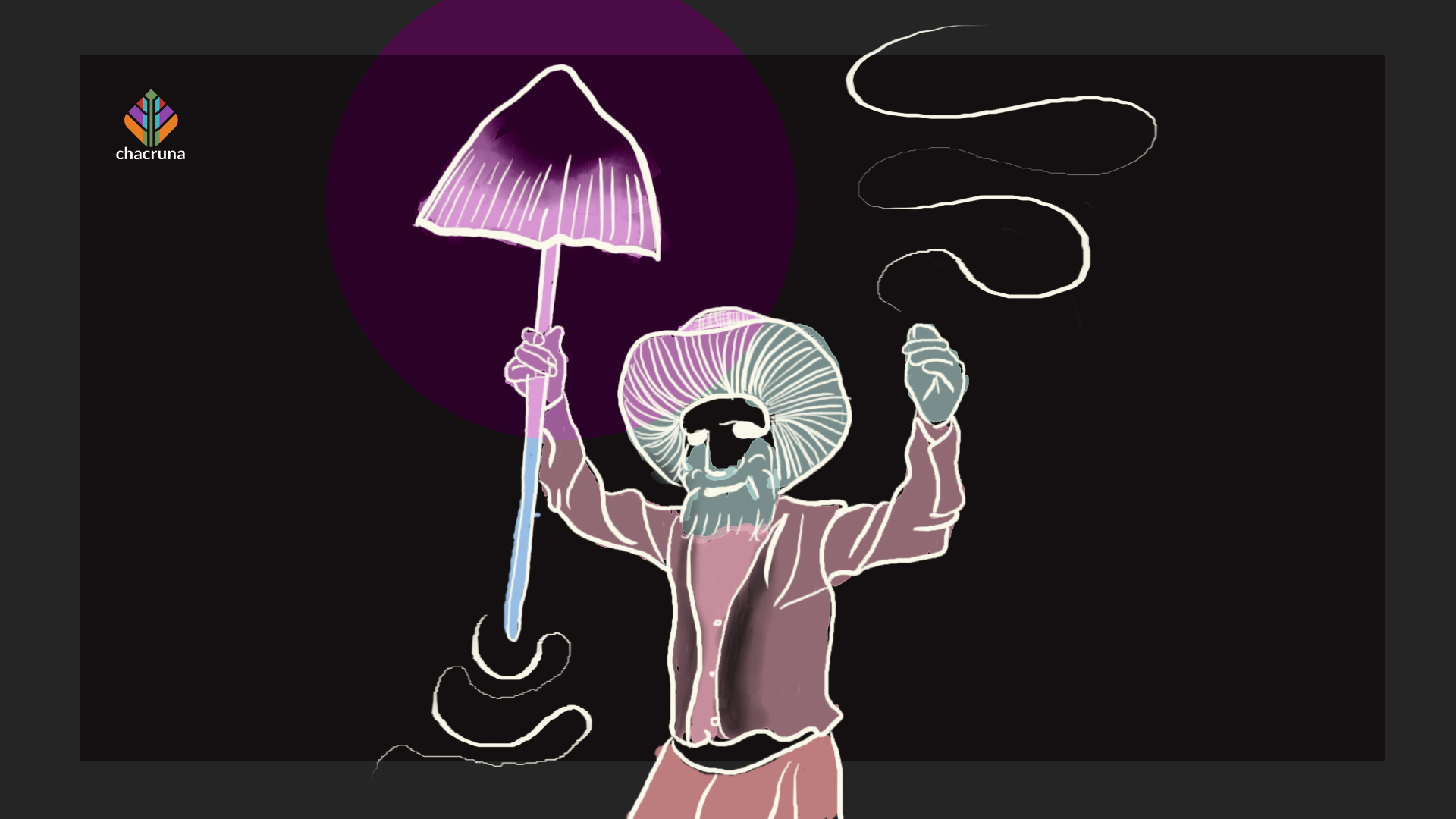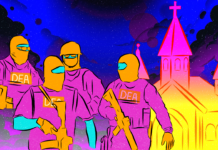- Who’s in Charge of Psilocybin? - May 10, 2021
Are Clinical Trials the Only Legitimate Path to Accessing Psilocybin?
We’re in the middle of a psychedelic turf war. With psychedelic medicine on the cusp of going mainstream, an increasing number of players are vying for narrative control. From clinicians and investors to Indigenous groups and activists, debate is raging over whether psychedelics are spiritual tools, new psychiatric drugs, medicines for social change, or all of the above. This battle for control is not only unnecessary, but blinds us to a unique opportunity.
We can sense into what that might be by looking at the latest skirmish in this turf war. It came about on April 21, with the publication of a paper called Psilocybin: From Serendipity to Credibility in the journal Frontiers in Psychiatry (available here). Written by James Rucker and Allan Young (psychiatrists working at Kings College and the Maudsley, respectively), the paper questions whether legal clinics should be offering psilocybin-assisted experiences before psilocybin has gone through the clinical trial process.
While the paper raises some important arguments, it also points to underlying tensions around power and access in the psychedelic field that could, if left unresolved, become detrimental to the psychedelic renaissance. In this article, I will critique the paper with the aim of seeing where a resolution may lie between the competing epistemologies in the space.
I will note before I do that that I previously had a working relationship with Synthesis, a center mentioned by the paper. I also participated in the guide training for James Rucker’s upcoming psilocybin trial at Kings. I currently have no professional association with either organisation.
The Battle Lines
Much of Rucker & Young’s argument centers around the idea that credibility and safety for psilocybin-assisted therapy relies on its journey through the clinical trial process. The paper begins:
Psilocybin has a long history of non-medical use and some seem to infer from this that it has therapeutic utility. Early phase clinical trials with psilocybin are encouraging… meanwhile, retreat centers offering paid experiences with psilocybin truffles have opened in some countries, often using early phase clinical trial data as a basis for bold, public facing claims. This seems unwise.
It is unethical to use early clinical trial data to sell your product or service.
The paper rightly points to the problem of using clinical trial data to attract people to retreat centers. This is an important point. It is unethical to use early clinical trial data to sell your product or service. Overall, Rucker and Young appear to care that psychedelics are used responsibly, particularly with vulnerable people, and that we avoid a situation where any center can make unregulated therapeutic claims. Likewise, I would agree with the authors that a situation of unregulated therapeutic psychedelic use by unqualified practitioners isn’t desirable.
However, in almost all cases, we are talking about different populations. Most retreat centers screen out people struggling with serious mental health difficulties and focus not on therapy but personal growth.
In a 2019 COMPASS investor pitch sent to me by an anonymous source, they list a number of early clinical trials, including their own, to tell investors: “Positive signals from early-stage trials present commercial opportunity for treatment-resistant depression, according to health care regulators.”
The authors rightly point out that a legal retreat advertising the results of their own research without naming their bias is an issue. It is curious, then, that the authors don’t speak to the fact that COMPASS Pathways, who have funded their studies and appear in the paper’s “conflict of interest” section, use early clinical trial data and advertise the results of their own research to attract potential investors. In a 2019 COMPASS investor pitch sent to me by an anonymous source, they list a number of early clinical trials, including their own, to tell investors: “Positive signals from early-stage trials present commercial opportunity for treatment-resistant depression, according to health care regulators.”
If Rucker and Young are primarily concerned with the sanctity of the clinical trial process, their critique should apply to their own funding sources as well.
Discover Indigenous Reciprocity Iniciative of the Americas
The Problem with Clinical Trials
The key argument the paper rests on is that clinical trials are the safest and most responsible method we have to bring new drugs to market. Many, myself included, would agree. But psilocybin is not a new drug. It is a pre-existing molecule with a rich history of Indigenous use, particularly among the Mazatec, and an important history of underground and countercultural use as a spiritual sacrament or therapeutic tool. While the authors acknowledge this, they nevertheless go on to argue that we can’t know it’s therapeutically safe until it has gone through a clinical trial process.
This is perhaps their weakest argument. As Bia Labate et al. argued in a recent piece in Chacruna:
Alcohol and tobacco did not have to go through [clinical trials]. Statistically-sound clinical trials were introduced in the 1940s to ensure the safety and efficacy of new drugs and treatments. This is, of course, not the case with psilocybin or ayahuasca. Epidemiology, or the collective human experience of consumers of these substances, simply trumps clinical trials.”
If the authors were talking about a new chemical entity—for example, an analogue of MDMA or Ketamine—their argument for the supremacy of clinical trials would be very strong. However, they are instead arguing that their profession should gatekeep therapeutic approaches using a molecule with thousands of years of existing human use.
Much of this comes down to the word “therapy.” From the medical model, mental illness is something to be treated with drugs and therapy, and their domain. From a shamanic perspective, it might be a symptom of a deeper spiritual malady. In both cases, the molecule may be used as a part of a healing process, but there is little evidence to suggest that medics would be better qualified after a few decades than traditions with thousands of years of experience.
The clinical trials that Rucker and Young refer to in the paper use the very same molecule that Indigenous cultures like the Mazatec hold sacred.
The clinical trials that Rucker and Young refer to in the paper use the very same molecule that Indigenous cultures like the Mazatec hold sacred. As Ann Harrison recently reported in Lucid News, the COMP360 proprietary molecule that COMPASS has a patent for (and which all their other patent applications rest on) is simply a polymorph of psilocybin. A polymorph is a unique crystalline structure, and it is highly contentious whether they can be patented. This is because a polymorph doesn’t change the molecule itself, and it disappears once ingested. As Nicholas Cozzi argues in the same article, there is no evidence that COMP360 has any clinical difference from any other form of the (pre-existing) molecule psilocybin.
This brings us to one of the most difficult philosophical questions this paper presents: Who (if anyone) has the right to control access to psilocybin? Some believe that psychiatrists are best placed to be at the top of the hierarchy, and that these substances should enter the mainstream primarily as mental health tools. Many activists, and religious and indigenous groups for whom these are sacraments, vehemently disagree.
Even if we were to ignore these alternative perspectives, we would still have to ask whether psychiatry and the medical establishment as a whole are best suited on their own merits to steward psychedelics.
While I believe the medical establishment and clinicians play a vital role, I don’t believe any existing institution should sit at the top of a hierarchy of access. Of the options we have, the medical establishment would not be my first choice. The very reason we’re looking for new mental health treatments is that psychiatry, and its reductionist biological model of mental health, has failed in preventing or adequately treating epidemic rates of depression and anxiety. In addition to this, psychology is in the grips of a serious replication crisis. As The Atlantic reports, “Ironically enough, it seems that one of the most reliable findings in psychology is that only half of psychological studies can be successfully repeated.”
The replication crisis isn’t confined to psychology; it’s a growing problem in medical research overall. To pick one of many examples, an article in Nature revealed that Bayer only managed to replicate 23 of 67 drug studies. The clinical trial process relies on reproducibility for its validity. However, it is very far from perfect, and the epistemological foundations it rests on are shakier than they appear.

Alternatives to Clinical Trials
Despite these issues, the paper asks us explicitly to trust this model without offering an internal critique. As a result, much of the argument relies on a logical fallacy known as “appeal to authority”—the authority here being Western psychiatry and the clinical trial model.
To get a better sense of how clinical trials compare to legal retreats, I spoke to Dr. Rosalind Watts. Watts was the clinical lead on the recent Imperial College trial strudying the effect of psilocybin on long-term depression, and has since moved to Synthesis. She pointed out that, while the clinical trial model is important, fitting psychedelic-assisted therapy into it can be trying to force a square peg into a round hole. Likewise, legal retreats are often successfully held by facilitators and clinicians with extensive psychedelic experience, with participants carefully screened ahead of time.
One issue she pointed out is that drug study models are designed to have follow-up periods of just six weeks with participants. Many participants are still in the afterglow period six weeks after a psilocybin treatment, but often experience a decline after this that is rarely included in the data. This may be creating a false narrative around how psychedelics lead to therapeutic outcomes. In a legal retreat, there is much more scope for adequate preparation, aftercare, and above all, the potential of the support of other participants with a shared experience.
She pointed out that both models can and should exist simultaneously. Similarly, Robin Carhart Harris has recently argued in a paper in Psychopharmacology that the field of psychedelic science would benefit from gathering real-world data on legal psychedelic interventions to supplement what we’re learning from clinical trials. He suggests that “confirmatory trials typically engineer experimental conditions to support strong scientific inferences, but these often poorly reflect real-world conditions.” Conversely, he points out that these other approaches could provide valuable data on the real-world conditions in which treatment will be offered.
Conflicts of Interest
There are significant economic implications for companies like COMPASS Pathways if psilocybin-assisted therapy is democratized, as it will be in Oregon.
The most interesting question that arises from this paper is whether these arguments are being made in good faith. Against the backdrop of new models of psychedelic therapy arising that compete with the clinical trial path to mainstreaming, it would be disingenuous to leave the question of motivation unexamined. There are significant economic implications for companies like COMPASS Pathways if psilocybin-assisted therapy is democratized, as it will be in Oregon. It also undermines the clinical trial path to mainstream legitimacy that the authors are calling for. Some high profile retreat centers have supported the Oregon model, while COMPASS Pathways have expressed concerns around it.
These are all potential conflicts of interest that should have been addressed in the paper. The authors do make an effort to address their bias and list some conflicts of interest, and toward the end of the paper reflect the following:
Why are we saying this? We lead a research team investigating psilocybin. We are “representatives of the establishment”: established medics with all the motivations to maintain the current hegemony and power structures that were associated with the prohibition of classical psychedelics in the first place…. Surely, we are biased ourselves. Indeed, we are. However, if we are, then we are in a context where processes of external regulation provide a necessary balance to that.
The last sentence of this statement is somewhat confusing, but the logical progression is:
We are biased and incentivized to maintain the existing power structure around psychedelics. This bias is mitigated because it’s happening within a clinical trial model that reduces the effects of this bias due to the external regulation of said model.
A more unbiased model might involve regulation from outside of the field; for example, by a multidisciplinary panel of stakeholders who also have a claim over access to psychedelic medicine; Indigenous practitioners, underground therapists, activists, countercultural critics, spiritual leaders, and more.
However, the external regulation of the medical system comes from power structures that have already explicitly bought into its assumptions and claims to truth. A more unbiased model might involve regulation from outside of the field; for example, by a multidisciplinary panel of stakeholders who also have a claim over access to psychedelic medicine; Indigenous practitioners, underground therapists, activists, countercultural critics, spiritual leaders, and more. Without a wider framing that takes into account other perspectives, the paper rests on a circular argument held up by an appeal to authority and little else.
Conclusions
At the beginning of this piece, I suggested that the battle for narrative control in the psychedelic field is blinding us to an opportunity. I believe it is this: the chance to create a truly unique, multidisciplinary, and ground-breaking model of healing.
Instead, we might ask what it looks like to create new structures and reform our institutions so that they can encompass the complexity and multidisciplinary awareness that psychedelics require if they’re going to have any significant impact on the world.
We can’t do that if we’re rooted in opposition, if we hold up, with a kind of adolescent certainty, whatever model we believe to be superior. We can argue for cognitive liberty, or rail against the establishment, or stay quiet and hope we don’t rock the boat and mess it all up.
I believe all of these responses belong to an old paradigm; one in which we have to make a binary choice between freedom and responsibility, or find some dead grey zone between the two. Instead, we might ask what it looks like to create new structures and reform our institutions so that they can encompass the complexity and multidisciplinary awareness that psychedelics require if they’re going to have any significant impact on the world.
I wrote this article because I believe the tone of Rucker & Young’s paper is inimical to this kind of synthesis. For the psychedelic renaissance to be accessible to as many people as possible, we are going to have to come from a place of epistemic humility. We do not have to choose between clinics and churches; we can have both. But we won’t get there by trying to defend our own turf.
Disclaimer
Opinions and interpretations presented in this article are the author’s own, and do not necessarily coincide with Chacruna’s positions.
Art by Mariom Luna.
Take a minute to browse our stock:
Did you enjoy reading this article?
Please support Chacruna's work by donating to us. We are an independent organization and we offer free education and advocacy for psychedelic plant medicines. We are a team of dedicated volunteers!
Can you help Chacruna advance cultural understanding around these substances?
















